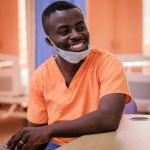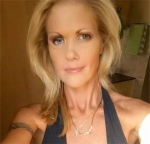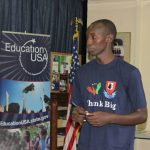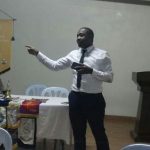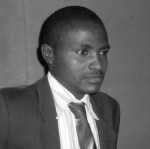

Join the first #hcsmAFRICA Twitter chat with the co-founders to share your perspective about precision medical education in Africa. We model our discussions around the Sustainable Development Goals and how they intersect medical education (SDG3). Research findings from this discussion will potentially be presented at the upcoming Stanford University Medicine X | Ed in Silicon Valley, 22-23 April, 2017 in a rapid report. We utilise an ethical design research approach, therefore we invite all stakeholders in healthcare, including the public. Transcripts are recorded by Symplur for R&D.
Details:
Hashtag: #hcsmAFRICA
Moderated by the Twitter handle @hcsmAFRICA
DATE: 31 January 2017
TIME: 18:00 GMT / 20:00 SAST / 13:00 ET
How to participate
CO-HOSTED BY:
- Kobby Blay GhanaHealthNest, Ghana @hcsmGH
- Vanessa Carter e-Patient Activist, South Africa @hcsmSA
- Egide Haragirimana GP Registrar, Burundi @hcsmBDI
- CK Japheth Innovation Village, Uganda @hcsmUG
- Victor Omoregbee HealthCamp, Nigeria @hcsmNG


Please introduce yourself when entering the chat, even after it has commenced. Start your answers with T1, T2, T3, T4 or CT for transcript purposes, after the moderator has prompted. Questions will be prompted at 10-minute intervals. Any question can be answered throughout the 1-hour session with the corresponding T and number.
T1:- In your professional opinion, what are the gaps in our medical education system?
T2:- How do you think emerging technology and the web could be used to improve medical education?
T3:- What can be done to accelerate a digital health curriculum at our major educational institutions?
T4:- Which stakeholders or citizens should be included into a 21st-century, digital medical education and why?
T5:- Why do you think access to a global medical education platform is important to our world economy?
(e.g. What can the global south teach the global north and vice versa.)
T6: What medical training can or can’t benefit from digital technologies, and why?
CT: Closing Thoughts – What do you think is important to add to this conversation?
#hcsmAFRICA Community Etiquette
* Please read the blog first to familiarise yourself with the topic
* Start your answers with T1, T2, T3, T4 or CT for transcript purposes
* Answer only after the moderator has prompted everyone with the question.
* Please stick to the topic during the conversation
* Lurkers, please introduce yourself, let us know you are there, we welcome you to join anytime
* If you are not on a chat platform like www.tchat.io, remember to use the #hcsmAFRICA hashtag in your tweets so that they record on transcript
* Kindly respect our geo-community and members. Inappropriate behaviour can be reported. Refer to the Twitter Code of Conduct to learn more.

TOPIC FOR DISCUSSION:
Closing gaps in Medical Education in South Africa using a Digital Platform
An e-Patient perspective from Vanessa Carter (Ref: Abstract)
An ethical system design research approach for health IT using Twitter chat tools that enable diverse stakeholder participation, both locally and globally;
The shortage of Medical Education facilities in developing countries like South Africa has had major repercussions on the local and global economy. In a recent 2014 article, it was reported that there were more than 36 000 applications for the 1 770 places available for first-year students in South Africa’s eight medical schools. For many, it has been disappointing that they were not getting the opportunity to study, despite ticking all the boxes. A growing population and lack of investment have been a portion of the contributing criteria. To worsen the crisis, students at some universities across South Africa are protesting violently for free education, such as in the #FeesMustFall campaign because of the heavy burden of poverty and high fees.
Often, we stereotype medical education to a university earned PhD degree, a doctor, a nurse, a specialist, a professor, but as this WHO article emphasises, “A well-functioning health system working in harmony is built on having trained and motivated health workers, a well-maintained infrastructure,
and a reliable supply of medicines and technologies, backed by adequate funding, strong health plans and evidence-based policies”.
An all-inclusive, Universal HealthCare (UHC) workforce consists of every stakeholder whose predominant activities are aimed at enhancing a healthy population. They include doctors, specialists, nurses, caregivers, pharmacists, laboratory technicians, social workers, patient advocates — management and support workers such as financial officers, cooks, drivers and cleaners. Pressing global health concerns like infectious disease cannot be managed without a well-trained and comprehensive interdisciplinary team. Precision medicine is also not possible without this collaborative synergy. Imagine this; a leading surgeon performs surgery on a patient, but the cleanliness of the theatre causes an infection. Could it have been prevented if we focused on empowering cleaning workers with a more comprehensive medical education about infection prevention?
First, we must consider the Digital Divides
Radios, television sets, computers and the internet are tools used to package and transmit information and knowledge and are broadly referred to as Information and Communication Technologies (ICTs). The gap between people with access to ICTs and those without is generally referred to as the digital divide. Today, it is most extreme in Africa. As Wikipedia explains, “A digital divide is an economic and social inequality with regard to access to, use of, or impact of information and communication technologies (ICTs)”.
Digital divides in developing countries include not only the basic access to ICTs but also digital empowerment through citizen training and being able to overcome socio-economic circumstances like gender equality. The cost of data, poverty and lack of a reliable broadband infrastructure are other obvious contributors. Without addressing the digital divides first, it would be impossible to reach the 2030 goals agenda. According to a global survey, 52% of the South African population use the internet and we are placed within the top 25 countries, which means the time is right to improve digital service delivery. Even providing an informative, patient-centered website at a provincial hospital could be an effective solution for heavy administration and improve overcrowding. Unfortunately, our user statistics don’t demonstrate the connection speed and affordability, especially in rural areas. ICTs and digitally skilled workers in public hospitals are also limited because there has been no funding and skills development. The question remains, how can government, corporate or private sector help to overcome this barrier first for sustainable eHealth development?
Closing Gaps in Medical Education
Infrastructure and connectivity issues are part of the United Nation’s Sustainable Development Goal agenda which South Africa have recently adopted. How would you reimagine medical education if it was accessible with the right tools like access to ICTs?
The following abstract illustrates how digital technologies could improve access to every stakeholder in healthcare to enable a precision health IT system
A digital social network could be developed for healthcare which acts as a central entry point for learners to find resources like Online Communities, MOOCs, Live Lectures, Thought Leaders, News about Global Emerging Technology, Disease Control Information, Policy News, Events and more. The user-interface (UI) of the platform should be simple as well as visual to simplify navigation and improve participation, particularly bearing in mind that not every user will be an experienced internet user.
Video courtesy of MedicActiV (SimforHealth)
Live lectures could be filmed in virtual reality to improve the learner’s experience. Collaborating with organisations like Doctors without Borders (MSF) or rural clinics like Zithulele might provide diverse opportunities for e-Interns to gain Real World Experience (RWE) which could count towards their PhD degree. This is especially beneficial to our global refugee issues and provides a volunteer solution for these organisations who are facing dire shortages for qualified helping hands. Live virtual surgeries like those performed in the recent Medical Realities recordings could also be made more accessible to African medical students.
Video courtesy of our panel expert Dr. Shafi Ahmed, Medical Realities
Medical certificates could be offered to every citizen who wants a qualification as a community health worker to make a difference with diseases like TB & AIDS, women are prominent candidates to achieve this. As part of their virtual health qualification, they should receive equipment like an iPad to capture data from each patient they consult and be able to share animations to educate them about self-care and adherence. Perhaps they should even have the opportunity to earn incentives for submitting complete data to a National Health Database and for showing progress towards achieving healthy outcomes.
Digital solutions are adaptable by design, therefore they can enable learners to choose a preferred language and address other barriers like literacy, disability, culture and religion. Online communities can be used to separate different demographic learners like medical students, nurses, spiritual healers, volunteers, caregivers, pharmacists, patient advocates and community workers. Data from these collective conversations could be useful to identifying issues to adapt education curriculums in real-time. No health worker should be excluded, in terms of HCPs, patients should have the freedom to choose their type of health provider whether they are traditional or modern.
Video courtesy of Doctors without Borders (MSF South Africa)
Online Communities
Patient communities are powerful for peer-to-peer support, education and improved access to healthcare. Digital patient communities enable continuity of care between appointments and enables the patient to provide real-time feedback to their HCP using devices like their smartphones and apps, which could improve aggregation of data for global health. Facebook reported close to six million health-related groups during 2016, these statistics alone demonstrate the potential of online collectives, although the data might serve the economy more effectively if it were centralised, not dispersed on multiple public networks owned privately. Many of these Facebook groups have been created by patients, caregivers, medical students, health workers and even doctors.
By including patient communities on a single digital platform, academia has access to narratives, similar to how big pharma use social listening techniques for clinical trial R&D. Mystery medical cases could benefit from communities by using crowdsourcing techniques for peer review. A good example of this type of confidential ecosystem is DefinitiveDX. Cybersecurity measures would be important to consider too, especially where clinical research data is being aggregated.
Interdisciplinary Medicine and the Medical Humanities
As we move into the era of genomics and biotechnology after the completion of the Human Genome Project, it would also be critical to consider interdisciplinary care which goes beyond the norm of a few medical specialists. The medical humanities consider the Art of Medicine and the whole human experience as well as questions about bioethics. These include genetic editing using CRISPR or Bioprinting. The medical humanities are also useful to exploring changing policies regarding robotic and bionic technologies, especially for patients who don’t understand the impact of their “informed consent“. We should question how technologies could impact the lives of patients, especially where there are extensive barriers in understanding caused by literacy issues, culture or disability. Ethics in how we collect data to diagnose patients is also critical to explore from all angles because it may not always be precise for an individual.
Video courtesy of Cape Town University – Medicine and the Arts course
This is a fraction of what can be done using online technology, there are multiple ways that a digital health geographic platform could benefit medical education in South Africa, however, it will depend heavily on active user feedback, open idea sharing, collaboration and participation to progressively adapt the design and improve functionality so that it serves the health sector productively.
Who knows what the next version of the Web (Health 3.0) and the Internet of Things will bring, surely this is just the beginning of what we can achieve by working hard together. Let’s leave no one behind.

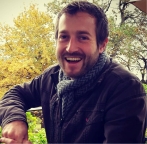 Damian Hacking (South Africa)
Damian Hacking (South Africa)
eHealth Activity Manager – Medecins Sans Frontieres
Linkedin
Twitter
Damian Hacking is the eHealth Activity Manager for Medecins Sans Frontieres (MSF) in South Africa and is based in the Khayelitsha project. He has worked on mHealth projects since 2012, with a focus on patient-centered interventions, and has been working for MSF for the past 3 years. Damian has an MPH in Health Economics from the University of Cape Town, as well as an MMed from the same institution. Damian is currently working on innovative ways to deliver blood results to patients, capture routine data into electronic registers, and monitor pill adherence. Damian lives in Stellenbosch, South Africa.

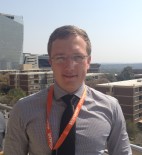 André van Zyl (South Africa)
André van Zyl (South Africa)
JuPHASA – Junior Public Health Association of South Africa
Linkedin
Twitter
André started his academic career studying psychology and sociology at the Nelson Mandela Metropolitan University (NMMU). As a student, because of a long interest in information technology, he started a small business providing internet services to students. After completing his studies he worked in an addiction treatment facility, centre for children with developmental disorders, and an eLearning company. His passion for people’s wellbeing, interest in technology, and experience in eLearing prompted him to enrol for the master in public health (MPH) degree at the University of Pretoria. For his MPH research, he explored the availability of health education resources to life orientation educators; which included information technology resources. In 2015, he was elected as the secretary for the Junior Public Health Association of South Africa (JuPHASA). He is currently serving on the executive committee of the Public Health Association of South Africa (PHASA) and as the president of JuPHASA. In 2016, he started a special interest group (SIG) under the PHASA umbrella focusing on health information and technology – the PHASA HIT SIG. He is currently employed at the Foundation for Professional Development (FPD) where he is working in the FPD research unit. He has a vision; to achieve health for all through building the capacity of the health workforce to improve population health. He believes that this could be achieved by using technology for: accessible and affordable education; population-wide health communication; mobilising health resources; and efficient resource utilisation.

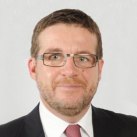 Xavier Abadie (Europe)
Xavier Abadie (Europe)
SimforHealth
Linkedin
Twitter
Expertise: Digital Medical Education Expert
Xavier is Director of International Business Development at SimforHealth. With more than 20 years of experience in the medical field, including several senior management positions and consultancy, Xavier has a solid experience of development of Small and Medium companies.
His areas of competencies are related to bio-logistics, medical devices, and digital industry, both nationally and Internationally.
He is also deeply involved in education, as Board Member of a major European Institution of Higher Education.

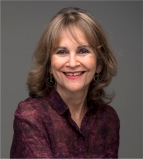
Denise Silber (Europe)
Basil Strategies
Linkedin
Twitter
Expertise: hcsm Pioneer, Global eHealth Innovation, Events
Driven by a passion to improve healthcare through better use of digital innovation, Denise Silber, founder-president of Basil Strategies and of the Doctors 2.0 & You conference series, has a deep vision and understanding of the opportunities and challenges of digital health. A global thought leader and social media influencer based in Paris, Denise Silber contributes her unique experience as both a strategic digital health consultant and coach in marketing and communication and as a digital health keynote speaker, emcee, and conference curator. Denise Silber has 20+ years of experience in digital health as well as 8+ years in ethical design research and methodology using web tools like Tweet chats and inclusive events, giving her a unique position as a pioneering, global eHealth leader. Denise’s career began after her graduation from Smith College, as an American diplomat in Mexico City working in public health and consular services. She then received her MBA from Harvard University and joined the pharmaceutical industry in Europe, where she became a marketing vice-president. After this corporate experience, Denise went on to create her own medical communications agency in Paris which she sold, in order to join a second start-up venture in New York, an early telemedicine company. While in the US, Denise was a founding member of the Internet Healthcare Coalition, producing the first ethics code for eHealth. In 2011, Denise Silber became one of the few American citizens named to the Legion of Honor, France’s highest civil decoration, for her work in advancing international eHealth.

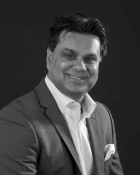 Shafi Ahmed PhD FRCS (United Kingdom)
Shafi Ahmed PhD FRCS (United Kingdom)
Medical Realities
Linkedin
Twitter
Expertise: Virtual Medical Education Pioneer
Mr Shafi Ahmed PhD FRCS FRCS Gen. Surg
Consultant General, Laparoscopic and Colorectal Surgeon
Associate Dean and Honorary Senior Lecturer
Barts and the London Medical School
Member of Council
Royal College of Surgeons of England
Director and Head of Programme Virtual MedicsTM (Google Glass project)
Director of Medical Realities (Virtual Reality)

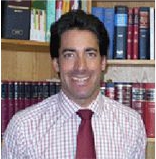 Tzvi Brivik (South Africa)
Tzvi Brivik (South Africa)
Malcolm Lyons and Brivik Attorneys
Linkedin
Facebook
Twitter
Expertise: Medical Law, Personal Injury and Consumer Rights
Tzvi Brivik is a partner and director at Malcolm Lyons and Brivik Attorneys in South Africa. Founding partner, Malcolm Lyons, who was recognised as a pioneer among his peers, established the first legal firm in South Africa specialising in Personal Injury Law in 1965. They are leading lawyers in South Africa with an unrivalled reputation for obtaining high levels of compensation for victims of accidents, medical malpractice and hospital negligence, consumer rights issues, defective products and unfair labour practice. They also provide legal services relating to eHealth and mHealth to both patients and providers.
The firm belongs to various international associations and has won numerous awards. They have also been responsible for some historic legal decisions in South Africa.
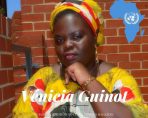 Vénicia Guinot (South Africa and Africa)
Vénicia Guinot (South Africa and Africa)
TROPICS Magazine
Linkedin
Twitter
Expertise: Women Empowerment and Entrepreneurship
Vénicia Guinot is arguably one of those young inspiring media personalities from Africa who started their companies with next to nothing. She has been recognised as a Multimedia Journalist holding the titles of Publisher, Media Entrepreneur, Executive Producer, Radio Host and Lifestyle Blogger. Guinot boasts a formidable career that has seen her become one of the most influential figures of Africa. Currently, she serves as the Publisher and Editor-in-Chief of TROPICS Magazine, the first and the biggest bilingual magazine published monthly. The TROPICS magazine today has close to a 500 000 online readership and is a partner of the Women Advancement Forum in Africa.

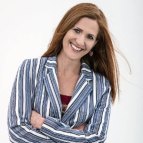 Professor Natalie Schellack (South Africa)
Professor Natalie Schellack (South Africa)
SASOCP
LinkedIn
Twitter
Expertise: Medical Education and ePharma
Natalie Schellack is currently working as an Associate Professor and Course Leader: Post Graduate Programmes in Clinical Pharmacy in the Department of Pharmacy, Sefako Makgatho Health Sciences University. She is part of the editorial team of three international journals, serves on the Gauteng Provincial Pharmacy and Therapeutics Committee Paediatric Essential Medicine List of the National Department of Health of South Africa. She further serves on the Sefako Makgatho Health Sciences Research and Ethics Committee and assists in different projects for the World Health Organisation. Professor Schellack is also the chairperson of the South African Society of Clinical Pharmacy (SASOCP).

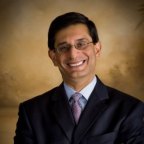 Norrie Daroga (USA)
Norrie Daroga (USA)
IDAvatars
Linkedin
Twitter
Expertise: Digital Avatar Expert (USA)
Norrie is the founder of IDAvatars whose clients include the Veterans Health Administration, United Health Care, CareFirst, and several provider and payor systems in healthcare. The platform consists of an intelligent avatar on a mobile device (iOS or Android), deeply integrated with an FDA approved device that provides data on a person’s temperature, blood oxygen, pulse rate, blood pressure and single lead EKG. The avatar detects environmental and emotional information about the person, combines it with biometric data, and provides the data to a clinician and family caregiver in an engaging user interface. Technologies include speech and emotion recognition engines, natural language processing and cognitive analytics provided by IBM Watson®. Home health providers, care management teams and managed care providers are targeted markets, with an emphasis on the aging population in the communities they serve. Avatars are useful to addressing barriers in healthcare, such as disability, literacy, cultural diversity and language differences.

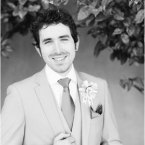 Werner Swanepoel (South Africa)
Werner Swanepoel (South Africa)
MP Consulting
Linkedin
Twitter
Expertise: Digital and Virtual Medical Education, CPD
Werner has five years auditing and risk management experience in addition to completing his SAICA training contract at PricewaterhouseCoopers during 2010, after which he qualified as a Chartered Accountant (SAICA) and Auditor (IRBA). After completion of his articles, he incorporated Medical Practice Consulting (Pty) Ltd (MPC), a specialist risk management firm in the South African healthcare industry, where he is appointed as Managing Director. Under his leadership, Medical Practice Consulting represents the innovation hub of the South African healthcare industry by providing 19, 500 healthcare professionals with access to accredited training content and CPD compliance risk management services. As part of his responsibilities, Werner acts as audit quality reviewer on health information management systems developed by MPC. Werner acts in a quality review role for numerous USAID, PEPFAR, UNESCO and UNFPA technology solutions implemented in Southern Africa. MPC is a subsidiary of the Foundation for Professional Development (FPD) and a group company of the South African Medical Association (SAMA). The FPD group is registered with the Department of Higher Education and Training (DHET) as a Private Higher Education Institution (PHEI) in terms of Section 54(1)(c) of the Act and Regulation 16(4)(a).

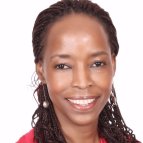 Kwanele Asante (South Africa)
Kwanele Asante (South Africa)
Wits University
Twitter
Expertise: Bioethics, MedTech, Patient Advocacy and Medical Law
Kwanele Asante-Shongwe (Ms.), is a lawyer, bioethicist, patient advocate, and health law lecturer at the Steve Biko Centre for Bioethics at the University of the Witwatersrand (Wits University). Kwanele was diagnosed with breast cancer at age 37 and sustained severe heart muscle damage from her chemotherapy treatment. Her lived experience of cancer and heart disease prompted her to become an African cancer treatment access activist – and to later qualify as a bioethicist. She spent 8 years working as a volunteer cancer peer educator and patient advocate in Soweto, the largest black township in South Africa. She was subsequently invited to become a Member of the Clinton Global Initiative in recognition of her “innovative approach to cancer education in Africa.” Her topics cover the impacts of socio-determinants of health on cancer care, equitable patient inclusion in cancer care and advancing African cancer equity. She was also awarded the Harvard Global Health Catalyst – 2016 African Ambassador Award in 2016 and has subsequently been awarded the 2016 Bakken Invitation Honoree Award.
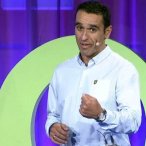 João Bocas (Europe)
João Bocas (Europe)
Linkedin
Twitter
Expertise: Digital Wearables Expert
João is a Wearables Expert, Digital Health Influencer & Keynote Speaker. His passion lies in helping others, sharing experiences, transferring knowledge, working collaboratively and passing on the latest innovation trends from the digital health world. As a thought leader in wearables, IoT, digital health and big data in healthcare, João explores the intersection of technology in modelling business models and shaping consumer behaviour. He also analyses the impact of disruptive innovations and shares future trends in the marketplace. He possesses more than 20 years of hands-on experience in Professional Sport and Corporate environments working with senior management, Boards and executive teams. He has worked across Healthcare, Financial Services, Media, Sporting, Third and Public Sector organisations. He was nominated a Finalist of the Great British Entrepreneurs Awards 2015 and he’s a proud board member of YMCA Brighton, a Charity organisation caring about community wellbeing.

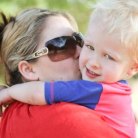 Kelly du Plessis (South Africa)
Kelly du Plessis (South Africa)
Rare Diseases South Africa and AfricaRare.org
Linkedin
Twitter
Expertise: eCaregiver, Rare Diseases, Clinical Trials, NPO’s
Founder and CEO of Rare Diseases South Africa (RDSA) a registered NPO (Non-profit organisation) founded in 2013, that aims to assist patients and families affected by rare conditions receive access to life-saving treatment and supportive care for improving quality of life. In South Africa, where lack of medical infrastructure, research and support is a problem, RDSA has become a beacon of hope for families affected by rare diseases and provides the resources for medical care and practical aid for individuals suffering from rare conditions. Kelly is also a founding member of the Africa Rare Diseases Digital Patient Platform, a partner organisation of the Rare X conference in association with ICORD. She is also vice chair of the Genetic Alliance of South Africa, a board member for the Pulmonary Hypertension Association South Africa, chairperson of the Gaucher & LSD Society of South Africa.

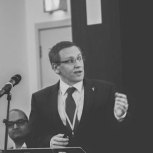 Gareth Presch (United Kingdom)
Gareth Presch (United Kingdom)
World Health Innovation Summit
Linkedin
Twitter
Expertise: eCaregiver (Cancer), Community-Driven Innovation
Gareth is a social entrepreneur. He is the founder of the World Health Innovation Summit, a platform to inspire, innovate and share knowledge to improve healthcare using a community approach. Gareth is a problem solver and healthcare strategist who has experience working in public, private and voluntary healthcare settings in the NHS and abroad. Patient focused and quality-driven, a former Chief Officer of the National Haemophilia Council, a statutory body in Ireland. Gareth has also managed National Clinical Programmes on Blood Transfusion. establishment of the National Blood Transfusion Committee, Haemochromatosis and the Endoscopy improvement programme. He has extensive networks around the world including Africa and is a member of the global educator’s project. He believes in a holistic approach to healthcare delivery.
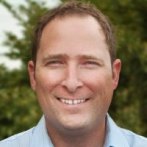
Eran Kabakov
Co-Founder & CEO Docola Inc.
Linkedin
Twitter
Docola, Inc. develops a platform that enables healthcare providers to educate and engage patients throughout the care continuum. Its platform allows healthcare providers to aggregate information from any source, combine this information into courses, prescribe these courses to patients, and track patient participation and comprehension.

Special Guests:
Dr. Jamie Saris, Senior Lecturer in the Department of Anthropology, Maynooth University, Co-chair of the Global Diseases of Poverty Consortium. Medical Anthropology, Global Health
Dr. Hannelie Meyer – Associate Professor, School of Pharmacy at Sefako Makgatho Health Sciences University, South Africa
Dr. Marc Slabbert – CEO of Aretha Health – South African Digital Hospital Group
Dr. Mayank Agarwal – Family Physician, Clinical Informatics and Precision Medicine – India
Dr. Isack Gakuru, Registered Medical Laboratory Technician in Rwanda, Africa
Dr. Renier Coetzee (Pharm.D) – University of the Western Cape -School of Pharmacy, South Africa
Dr. Miranda Moloto, Public eHealth Systems and Practitioner, Telemedicine in Africa
Charl Möller, Project Manager – Foundation for Professional Development, South Africa
